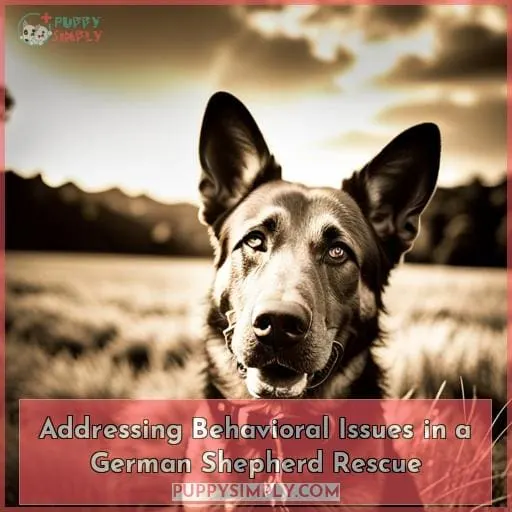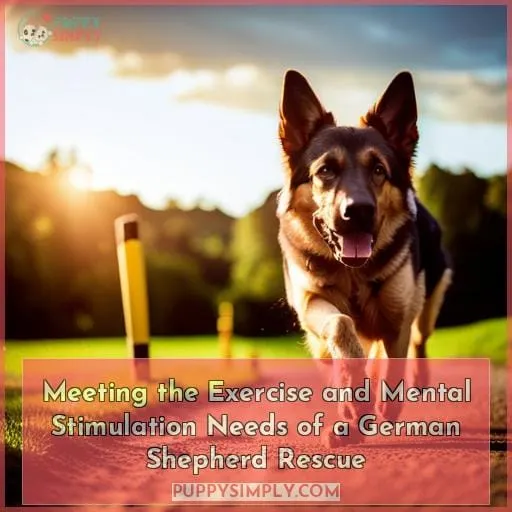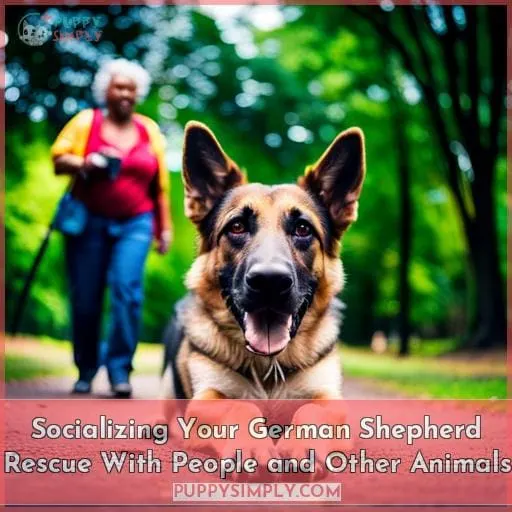This site is supported by our readers. We may earn a commission, at no cost to you, if you purchase through links.
 Ready to find your perfect furry companion? Look no further than our comprehensive guide on finding and adopting a German Shepherd rescue.
Ready to find your perfect furry companion? Look no further than our comprehensive guide on finding and adopting a German Shepherd rescue.
We’ll walk you through the process, from locating reputable rescues to what to expect during the adoption journey. With our tips and insights, you’ll be well-prepared for welcoming a loyal and loving German Shepherd into your home.
So let’s embark on this exciting adventure together as we help you find your new best friend!
Table Of Contents
- Key Takeaways
- How to Find a German Shepherd Rescue
- What to Expect When Adopting a German Shepherd Rescue
- What to Consider Before Adopting a German Shepherd Rescue
- How to Prepare Your Home for a German Shepherd Rescue
- Building Trust and Bonding With Your German Shepherd Rescue
- Addressing Behavioral Issues in a German Shepherd Rescue
- Meeting the Exercise and Mental Stimulation Needs of a German Shepherd Rescue
- Providing Proper Nutrition and Healthcare for Your German Shepherd Rescue
- Socializing Your German Shepherd Rescue With People and Other Animals
- Frequently Asked Questions (FAQs)
- Can I adopt a German Shepherd rescue if I have never owned a dog before?
- How long does it typically take to bond with a German Shepherd rescue?
- What should I do if my German Shepherd rescue exhibits aggressive behavior?
- How much exercise does a German Shepherd rescue need on a daily basis?
- Are there any specific dietary requirements for a German Shepherd rescue?
- Conclusion
Key Takeaways
- Research local shelters and rescue organizations
- Consider reputation and adoption requirements
- Prepare for the transition to a new home
- Prioritize training and socialization
How to Find a German Shepherd Rescue
To find a German Shepherd Rescue, you can start by searching online for local shelters and rescue organizations that specialize in this breed.
These organizations are dedicated to rescuing and rehoming German Shepherds in need of a loving home. They’ve extensive knowledge of the breed’s characteristics, behavior, and specific needs.
When researching different rescue organizations, consider their reputations within the community as well as their adoption requirements and fees. Some may require an application process or a home visit to ensure that you’re prepared to provide a safe environment for the dog.
It’s also important to inquire about any training programs they offer or if they can recommend reputable trainers who specialize in working with German Shepherds.
Taking these steps will help you connect with reliable sources that can guide you through finding your perfect canine companion while ensuring that both your family and the rescued dog have successful outcomes.
What to Expect When Adopting a German Shepherd Rescue
When adopting a German Shepherd rescue, you can expect:
- An initial meeting and evaluation to ensure the dog is a good fit for your home.
- The adoption process typically involves filling out an application, paying fees, and possibly undergoing a home visit or interview.
- Once you bring your new companion home, it’s important to provide training and socialization to help them adjust to their new environment and bond with you.
Initial Meeting and Evaluation
When you first meet a German Shepherd rescue, you’ll be able to evaluate their temperament and behavior.
It’s important to observe their body language and assess their comfort level with you.
During the initial meeting, ask questions about the dog’s history and any known behavioral issues.
Take note of how they interact with other dogs or people in the vicinity.
This evaluation will help determine if the German Shepherd rescue is a good fit for adoption.
Adoption Process and Requirements
Once you have completed the initial meeting and evaluation, it’s important to understand the adoption process and requirements for bringing a German Shepherd rescue into your home.
The adoption process typically involves:
- Filling out an application
- Undergoing a home visit
- Signing an adoption contract
- Paying an adoption fee
Before finalizing the adoption, the rescue may also require a health exam and microchip placement for identification purposes. Some rescues may place their dogs in foster care before they’re ready for permanent homes.
| Adoption Process | Requirements |
|---|---|
| Fill out application form | Provide proof of identity |
| Undergo home visit | Show commitment to training |
| Sign adoption contract | Pay necessary fees |
Table: Examples of Adoption Process Steps and Requirements
Transitioning to a New Home
As you bring your newly adopted German Shepherd rescue home, they’ll need time to adjust and settle into their new environment.
- Crate training: Introduce your rescue to a crate as a safe space for them.
- Housetraining: Be patient and consistent in teaching them where it’s appropriate to go potty.
- Separation anxiety: Help ease their anxiety by gradually leaving them alone for short periods of time.
- Fear of strangers and destructive behavior may occur due to the change in surroundings; provide reassurance, positive reinforcement training, and socialization opportunities.
Remember that each dog is unique, so be prepared for individual challenges during this transition process with your German Shepherd rescue.
Training and Socialization
Start by prioritizing training and socialization when you adopt a German Shepherd rescue.
Crate training can help with potty training and providing a safe space for your dog.
Positive reinforcement is key in obedience training, using rewards to reinforce desired behaviors.
Consider enrolling your pup in puppy classes to learn basic commands and interact with other dogs.
Socialization is crucial for a well-rounded dog, exposing them to different people, animals, and environments from an early age helps prevent behavioral issues down the line.
What to Consider Before Adopting a German Shepherd Rescue
Before adopting a German Shepherd rescue, there are several important factors to consider.
First and foremost, you need to evaluate if you have the time and commitment required to care for this breed, as they require daily exercise, mental stimulation, and socialization.
Additionally, it’s essential that you have enough space in your home and yard to accommodate their size and energy levels.
You should also be prepared for potential behavioral issues that may arise due to their background or past experiences.
Finally, it’s crucial to assess whether you can handle the financial responsibilities of owning a German Shepherd rescue including veterinary care expenses.
Time and Commitment
Before adopting a German Shepherd rescue, consider the amount of time and commitment required to properly care for this breed.
- Patience: German Shepherds require consistent training and socialization from an early age.
- Exercise: These dogs have high energy levels and need daily exercise to stay happy and healthy.
- Mental Stimulation: Provide them with challenging activities, puzzles, or training sessions to prevent boredom.
- Vet Visits & Costs: Regular veterinary check-ups and potential health issues can incur expenses.
Taking these factors into account will ensure that you’re prepared for the time and commitment needed when adopting a German Shepherd rescue.
Space and Exercise Needs
Consider the space and exercise needs of a German Shepherd rescue before bringing one into your home.
These dogs require ample indoor and outdoor space to roam, play, and stretch their legs. A large yard is ideal for them to run around freely, but they also need regular walks or runs to stay physically fit.
Crate training can provide a safe place for rest and relaxation while ensuring proper behavior when indoors. Mental stimulation through interactive toys and games is equally important for their well-being.
Behavioral and Health Concerns
When adopting a German Shepherd rescue, it’s important to be aware of the behavioral and health concerns associated with this breed.
German Shepherds are known for their shedding, so regular grooming will be necessary.
They can also become destructive if not given enough exercise and mental stimulation.
Separation anxiety may be an issue, as they’re very protective of their owners.
It’s crucial to consider these factors before bringing a German Shepherd into your home and provide the necessary care for their specific needs.
Financial Responsibilities
As you delve into adopting a German Shepherd rescue, it’s important to be aware of the financial responsibilities that come with welcoming a new furry family member into your home.
Adoption fees, medical costs, training costs, food costs, and insurance are all factors to consider when budgeting for your new companion.
It’s crucial to plan ahead and set aside savings for unexpected expenses that may arise.
By being financially prepared, you can provide the best care and support for your German Shepherd rescue.
How to Prepare Your Home for a German Shepherd Rescue
To ensure the safety and comfort of your German Shepherd rescue, there are several important steps you need to take in preparing your home.
First, make sure that your fencing is secure and properly encloses the yard to prevent any escape attempts.
Next, pet-proofing the home becomes crucial by removing any hazards or toxic substances that could harm your new companion.
Lastly, providing shelter and comfort through a cozy dog bed or crate will help them feel safe and at ease in their new environment.
Additionally, gathering necessary supplies such as food bowls, toys, grooming tools,and training equipment will set them up for success on their journey to becoming a beloved member of your family.
Secure Fencing and Yard
To ensure the safety and security of your German Shepherd rescue, it’s vital to properly secure your fencing and yard.
- Fencing Height:
- Install a fence that’s at least 6 feet tall to prevent your German Shepherd from jumping over or escaping.
- Fence Strength:
- Use sturdy materials like wood or metal to withstand the strength of a 90-pound dog.
- Yard Space:
- Provide ample room for exercise and play, as these energetic dogs require plenty of space.
Pet-Proofing the Home
To prepare your home for a German Shepherd Rescue, start by pet-proofing the common areas and removing any potential hazards.
Make sure to:
- Secure electrical cords
- Keep trash cans out of reach
- Cover furniture corners
- Lock cabinets with hazardous items
Providing Shelter and Comfort
When preparing your home for a German Shepherd Rescue, ensuring proper shelter and comfort is essential.
- Create a safe space by crate training your new companion.
- Provide comfortable beds with cozy blankets for them to rest on.
- Include toys to keep them entertained and mentally stimulated.
- Make sure their shelter is warm, dry, and secure from any potential dangers or hazards in the environment.
Necessary Supplies and Equipment
You’ll need to gather the necessary supplies and equipment to prepare your home for a German Shepherd Rescue.
Start by getting a crate for their safe space and training purposes.
A collar, leash, and harness are essential for walks and outings.
Don’t forget about a sturdy food bowl for mealtimes!
As you navigate through the process of finding and adopting a German Shepherd Rescue, consider reaching out to German Shepherd breed organizations that can provide guidance along the way.
Building Trust and Bonding With Your German Shepherd Rescue
Building trust and bonding with your German Shepherd Rescue takes time, patience, and understanding.
It’s important to establish a routine and structure in their daily lives to help them feel secure.
Positive reinforcement training methods can be highly effective in building a strong bond with your rescue, while spending quality time together through activities such as exercise, playtime, and grooming can further strengthen the connection between you both.
Patience and Understanding
Building trust and bonding with your German Shepherd rescue requires patience and understanding.
It’s important to remember that your rescue may have experienced trauma or neglect in the past, which can affect their ability to trust humans.
Establishing a routine and structure will help them feel safe and secure.
Positive reinforcement training techniques should be used to build confidence and reinforce positive behaviors.
Spending quality time together through activities such as walks, playtime, or cuddling will also strengthen the bond between you both.
Establishing Routine and Structure
To build trust and establish a strong bond with your German Shepherd Rescue, it’s important to consistently incorporate routine and structure into their daily lives.
- Crate training: Use a crate as a safe space for your rescue dog, providing them with security and boundaries.
- Consistency: Stick to a regular schedule for meals, walks, playtime, and training sessions.
- Positive reinforcement: Reward good behavior with treats or praise to reinforce positive associations and encourage desired behaviors.
Positive Reinforcement Training
To build trust and strengthen the bond with your German Shepherd Rescue, use positive reinforcement training techniques.
Positive reinforcement involves rewarding desired behaviors with treats or praise to motivate your dog.
Consistency and patience are key when using this method of training.
By providing rewards for good behavior, you create a positive association in your dog’s mind and encourage them to repeat those behaviors.
Remember to be consistent in your approach and always reward desired actions promptly for best results.
Spending Quality Time Together
Spend quality time with your German Shepherd rescue to build trust and strengthen the bond between you.
- Playing fetch
- Going for walks
- Cuddling on the couch
- Training together
- Playing games
These activities not only provide physical exercise but also mental stimulation for your dog. By engaging in these activities regularly, you’ll create a positive association with each other and deepen your connection as companions.
Addressing Behavioral Issues in a German Shepherd Rescue
When adopting a German Shepherd rescue, it’s important to be prepared for potential behavioral issues that may arise.
Separation anxiety, fear and aggression, resource guarding, and leash reactivity are common challenges faced by rescued German Shepherds.
These issues can stem from past experiences or lack of proper socialization and training.
With patience, consistency, positive reinforcement techniques, and the guidance of a professional trainer or behaviorist if needed you can help address these behavioral issues in your new furry companion.
Separation Anxiety
When addressing separation anxiety in your German Shepherd rescue, it’s important to gradually acclimate them to being alone through positive reinforcement training and creating a safe and comfortable environment.
- Crate training: Introduce your dog to crate training as a secure space.
- Desensitization: Gradually increase the duration of time spent apart from your dog.
- Counter-conditioning: Associate being alone with positive experiences like treats or toys.
- Calming aids or medication: Consult with a veterinarian for potential options.
Fear and Aggression
If your German Shepherd rescue exhibits fear and aggression, it’s important to address these behavioral issues early on in order to create a safe and harmonious environment for both your dog and those around them.
Implementing techniques such as desensitization, counter conditioning, positive reinforcement training can help manage fear triggers effectively.
It’s crucial to provide proper management strategies while working with a professional trainer or behaviorist to ensure the well-being of your German Shepherd rescue.
Resource Guarding
You may encounter resource guarding behavior in a German Shepherd rescue.
This occurs when a dog becomes possessive and protective over their resources, such as food, toys, or even their space.
Signs of resource guarding can include growling, snapping, or biting when someone approaches these items.
Prevention involves teaching the dog that sharing is positive through training and desensitization exercises.
Treatment often requires the help of a professional trainer or behaviorist who can provide guidance on managing and modifying this behavior to ensure everyone’s safety.
Leash Reactivity
To address leash reactivity in your German Shepherd rescue, it’s important to establish consistent training and socialization practices.
- Desensitization: Gradually expose your dog to triggers that cause reactivity.
- Counterconditioning: Pair positive experiences with the trigger to change their emotional response.
- BAT training (Behavior Adjustment Training): Teach your dog alternative behaviors when faced with triggers.
- Muzzle training: Use a muzzle as a safety measure during walks or encounters with other dogs.
Meeting the Exercise and Mental Stimulation Needs of a German Shepherd Rescue
To meet the exercise and mental stimulation needs of a German Shepherd Rescue, it’s important to provide them with daily physical activity.
This breed thrives on exercise, so regular walks or runs are essential.
Enrichment activities such as puzzle toys and interactive games can also help keep their minds engaged.
Additionally, training classes and obedience sessions can provide structure and mental stimulation for these intelligent dogs.
Daily Exercise Requirements
Meeting the exercise and mental stimulation needs of your German Shepherd Rescue is essential for their overall well-being and happiness.
It’s recommended to provide them with 20 to 60 minutes of moderate-intensity exercise every day.
- Brisk walks
- Runs
- Playing fetch in a fenced yard
Structured off-leash playtime in a safe area can also be beneficial for their physical and mental health.
| Daily Exercise Ideas | Mental Stimulation Activities |
|---|---|
| – Brisk Walks | – Puzzle Toys |
| – Runs | – Training Sessions |
| – Fetch | – Nose Work Games |
By incorporating these exercises into your daily routine, you’re ensuring that your German Shepherd Rescue gets the physical activity they need while also challenging their minds through various stimulating activities.
This will help prevent boredom, reduce anxiety or destructive behavior, promote healthy weight management, improve muscle tone and cardiovascular health.
Enrichment Activities and Toys
To meet the exercise and mental stimulation needs of your German Shepherd Rescue, provide them with a variety of enrichment activities and toys.
These interactive toys will keep them engaged, entertained, and mentally stimulated.
Consider hide-and-seek puzzle games that challenge their problem-solving skills.
Provide chew toys to satisfy their natural urge to chew while promoting dental health.
And don’t forget about the classic game of fetch – it’s a great way for them to burn off energy while bonding with you!
Training and Obedience Classes
You can fulfill the exercise and mental stimulation needs of your German Shepherd Rescue by enrolling them in training and obedience classes.
These classes provide structured learning opportunities for your rescue to develop essential skills such as crate training, housetraining, socialization, and responding to commands.
Positive reinforcement techniques are used to encourage good behavior, making the learning process enjoyable for both you and your furry friend.
Training classes also offer a chance for bonding with other dog owners who share similar experiences.
Mental Stimulation Games and Puzzles
One way to meet the exercise and mental stimulation needs of your German Shepherd rescue is by incorporating engaging games and puzzles into their daily routine. This can help keep them mentally sharp, prevent boredom, and provide a fun outlet for their natural instincts.
Consider using interactive toys like snuffle mats or puzzle feeders to stimulate their minds while they search for hidden treats.
Nosework activities, agility courses, kong toys with frozen treats inside, lick mats filled with peanut butter or yogurt are also great options to challenge your German Shepherd’s problem-solving skills.
Providing Proper Nutrition and Healthcare for Your German Shepherd Rescue
To ensure the health and well-being of your German Shepherd rescue, it’s crucial to:
- Provide them with high-quality dog food and establish a feeding schedule that meets their nutritional needs.
- Regular veterinary check-ups and vaccinations are essential for preventing illnesses and detecting any potential health issues early on.
- Don’t forget about preventative care for fleas, ticks, and heartworms to keep your furry companion protected.
- Proper dental care and hygiene practices will help maintain their oral health in good condition.
High-Quality Dog Food and Feeding Schedule
Continuing to meet the exercise and mental stimulation needs of your German Shepherd Rescue, it’s important to provide them with high-quality dog food and a consistent feeding schedule.
A well-balanced diet is essential for their overall health and wellbeing. Look for dog foods that contain appropriate levels of protein, fat, and calories based on their age and breed.
Consulting with your veterinarian can help you determine the best diet plan for your German Shepherd Rescue’s specific nutritional needs.
Regular Veterinary Check-ups and Vaccinations
To ensure the health and well-being of your German Shepherd rescue, it’s important to prioritize regular veterinary check-ups and vaccinations.
Here are three key things to remember:
- Age: Start with an initial vet visit when you bring your rescue home, then follow their recommended schedule for future check-ups.
- Frequency: Regular visits should occur at least once a year for routine exams and vaccinations.
- Importance: Veterinary care helps detect any potential health issues early on, ensuring prompt treatment and preventing serious complications.
Preventative Care for Fleas, Ticks, and Heartworm
When caring for your German Shepherd Rescue, it’s essential to prioritize preventative care for fleas, ticks, and heartworm by providing proper nutrition and healthcare.
Regularly grooming your dog will help prevent infestations of fleas and ticks. Additionally, using flea prevention products recommended by your veterinarian can further protect against these parasites.
Heartworm prevention should also be a priority through the use of monthly medications prescribed by a vet.
| Preventative Care Tips | |
|---|---|
| Grooming Advice | Regularly groom your German Shepherd to prevent flea and tick infestations |
| Training Tips | Use preventive measures such as monthly medications prescribed by a vet for heartworm prevention |
Dental Care and Hygiene
Take care of your German Shepherd rescue’s dental health and hygiene by providing proper nutrition and regular dental care.
Brushing techniques, such as using a soft-bristled toothbrush and dog-specific toothpaste, can help keep their teeth clean.
Additionally, incorporating dental chews into their routine can provide a natural way to remove plaque buildup.
It’s also important to schedule professional cleanings with your veterinarian to address any underlying oral health issues.
Remember that preventive care is key in maintaining your German Shepherd rescue’s overall well-being.
Socializing Your German Shepherd Rescue With People and Other Animals
When bringing a German Shepherd rescue into your home, it’s important to focus on socializing them with people and other animals.
Positive experiences and rewards can help build trust and confidence in your dog, while ongoing socialization opportunities will expose them to different environments and situations.
If you notice any fear or aggression towards others, it’s crucial to address these issues promptly through proper training techniques and seeking professional help if needed.
Positive Experiences and Rewards
By consistently providing positive experiences and rewards, you can effectively socialize your German Shepherd rescue with people and other animals.
Positive reinforcement is a key component of training success, as it helps build trust and confidence in your dog.
Take advantage of bonding moments by engaging in joyful experiences together, such as playtime or interactive training sessions.
Reward-based training methods will create a positive association with socializing, making it an enjoyable experience for your German Shepherd rescue.
Ongoing Socialization Opportunities
To ensure the successful socialization of your German Shepherd rescue with people and other animals, it’s important that you continue providing ongoing opportunities for positive interactions.
Here are some ways to promote socialization:
- Arrange group play sessions with other friendly dogs.
- Take your dog on outdoor adventures, such as hikes or trips to the beach.
- Encourage canine companionship through playdates or visits to dog parks.
- Enroll in training classes where your German Shepherd can interact with different people and dogs.
- Gradually expose your dog to public outings in order to build their confidence and comfort around strangers.
Dealing With Fear or Aggression Towards Others
When socializing your German Shepherd rescue with people and other animals, addressing any fear or aggression towards others is crucial for creating a positive and safe environment.
Fearful aggression management can be achieved through various socialization techniques such as:
- Gradual exposure to new situations
- Positive reinforcement training
- Behavioral rehabilitation
By providing your rescue with the necessary tools to overcome their anxieties, you can help them develop into well-adjusted and confident companions.
Frequently Asked Questions (FAQs)
Can I adopt a German Shepherd rescue if I have never owned a dog before?
Yes, you can adopt a German Shepherd rescue even if you have never owned a dog before.
It’s important to:
- Research and understand the breed’s needs
- Provide proper training and socialization
- Be committed to their care for their lifetime
How long does it typically take to bond with a German Shepherd rescue?
Bonding with a German Shepherd rescue can vary depending on the dog’s past experiences and personality.
Patience, consistency, and positive reinforcement are key in building this special connection.
What should I do if my German Shepherd rescue exhibits aggressive behavior?
If your German Shepherd rescue exhibits aggressive behavior, it’s important to address the issue promptly.
Seek professional help from a certified dog trainer or behaviorist who can assess the situation and provide guidance on training techniques and strategies for managing aggression safely.
How much exercise does a German Shepherd rescue need on a daily basis?
A German Shepherd rescue will benefit from at least 1-2 hours of exercise every day.
This energetic breed needs physical and mental stimulation to stay happy and balanced.
Regular walks, playtime, and training sessions will keep your furry friend healthy and content.
Are there any specific dietary requirements for a German Shepherd rescue?
To meet the specific dietary needs of a German Shepherd rescue, it’s important to provide them with a balanced diet that supports their overall health and wellbeing.
Consult with a veterinarian for personalized recommendations based on your dog’s age, size, and any existing health conditions.
Conclusion
To conclude, adopting a German Shepherd rescue can be a rewarding experience filled with love and companionship.
[Keypoints]Remember to:
- Find a reputable rescue.
- Consider the needs and requirements of a German Shepherd.
- Create a safe and loving environment in your home.
With patience, training, and proper care, you can build a strong bond with your new furry friend.
Get ready for a lifetime of adventure and loyalty with your German Shepherd rescue.















